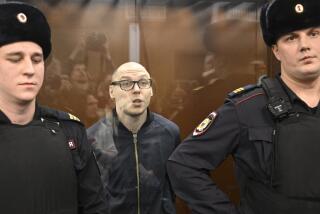Joseph Brodsky; Nobel-Winning Russian Poet
- Share via
Joseph Brodsky, the exiled Russian poet whose graceful, often haunting work won him a Nobel Prize and the admiration of political dissenters worldwide, died of heart failure Sunday in New York, at 55.
“He was the only Russian poet who enjoyed the right to be called a ‘great’ in his lifetime,” said Yevgeny Kiselyov, the host of Itogi, a weekly news program in Moscow.
Brodsky, who ranked with such great 20th-century Russian poets as Osip Mandelstam and Anna Akhmatova, rose to prominence in 1964 when, at the age of 23, he was sentenced to five years’ hard labor in the Arctic Circle for writing poetry without academic qualifications.
Interrogated at the trial about where his poetry had come from, he answered: “I thought that it came from God.”
Brodsky’s publisher, Roger Straus, said the Nobel laureate died at his New York home, where he had lived in exile for more than 20 years. Brodsky’s wife and child were at his side and his mother was flying to New York from Russia, Strauss said.
His works, which challenged the bleakness of Soviet life with linguistic brilliance and a mastery of sound and rhythm, circulated widely underground and finally prompted Soviet authorities to expel him, putting him on a plane to Vienna in 1972.
Describing his departure in a 1993 interview, Brodsky said he was summoned by the Soviet visa office and asked why he had not accepted an invitation to visit Israel. When he replied that he had been denied permission several times to travel to Europe, an official ordered him to fill out an application to leave, or “in about 10 or 20 days your life will become very difficult.”
“I glanced through the window and understood everything,” Brodsky recalled. “I had been imprisoned three times and had twice been incarcerated in a madhouse. . . . I said: ‘OK, give me the form.’ ”
When he arrived at the airport June 4, 1972, to leave home forever, Soviet customs officials took apart his portable typewriter “screw after screw. . . .,” Brodsky said. “Later [in Vienna], I reassembled it sitting in the hotel. That was their way of saying goodbye.”
He settled in the United States, where he was befriended by poet W.H. Auden, and became an American citizen in 1980.
Seven years later, at age 47, he won the Nobel Prize for Literature, the second youngest writer to receive the honor. Albert Camus won the prize at 44.
“A big step for me, and a small step for mankind,” the chain-smoking Brodsky joked after learning that he had won the prestigious prize.
Brodsky wrote both in his native Russian and in English, and added plays, essays and criticism to his poetic work. He taught himself English and Polish so he could translate the poems of John Donne and Milosz.
He once said American poetry had helped him survive years of persecution in the Soviet Union and “made me an American long before I arrived on these shores. . . . American poetry to me is a sort of relentless, nonstop sermon on human autonomy,” said Brodsky.
Born on May 24, 1940, Brodsky’s youth exposed him to alienation long before he lived in exile. His father lost a ranking post in the Russian navy because he was Jewish. Quitting school at 15, Brodsky began his own educational odyssey and worked at a variety of jobs--among them, sailor, photographer, coroner’s assistant and geologist.
He also began writing poetry--his work distinguished by its depth, irony and wit, and pervaded by the haunting themes of exile and loss.
“ ‘Keep your tears for more grave occasions,’ my mother would tell me when I was small,” Brodsky wrote. “And I am afraid I’ve succeeded more than she wanted me too.”
In one poem, Brodsky wrote of his desire to return someday to his St. Petersburg birthplace, to “die on Vasilievsky Island.” But even after the collapse of the Soviet system that tormented him, Brodsky did not return.
Asked in 1993 why he would not go home to be revered, Brodsky told WMNB-TV, a Russian station in New York: “To come for some time to the place where you were born and lived 32 years of your life, to come for a week, say hello to everyone, wag your tail and then buzz off? If one is to go there, one must stay. But the time for that has already passed.”
In addition to the Nobel Prize, Brodsky’s honors include the 1981 MacArthur Award, the 1986 National Book Award and an honorary doctorate of literature from Oxford University.
One of his poems goes, in part:
Freedom
Is when you forget the spelling of the tyrant’s name
And your mouth’s saliva is sweeter than Persian pie,
And though your brain is wrung tight as the horn of a ram
Nothing drops from your pale-blue eye.
Krikorian reported from Los Angeles and Boudreaux from Moscow; Times wire services contributed to this story.
More to Read
Sign up for Essential California
The most important California stories and recommendations in your inbox every morning.
You may occasionally receive promotional content from the Los Angeles Times.













